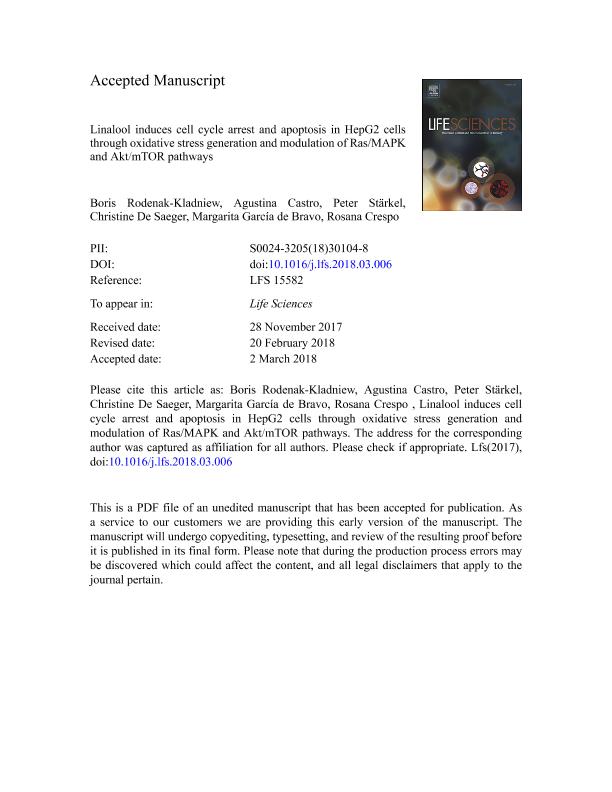Artículo
Linalool induces cell cycle arrest and apoptosis in HepG2 cells through oxidative stress generation and modulation of Ras/MAPK and Akt/mTOR pathways
Rodenak Kladniew, Boris Emilio ; Castro, Maria Agustina
; Castro, Maria Agustina ; Stärkel, Peter; De Saeger, Christine; Garcia, Margarita Maria
; Stärkel, Peter; De Saeger, Christine; Garcia, Margarita Maria ; Crespo, Rosana
; Crespo, Rosana
 ; Castro, Maria Agustina
; Castro, Maria Agustina ; Stärkel, Peter; De Saeger, Christine; Garcia, Margarita Maria
; Stärkel, Peter; De Saeger, Christine; Garcia, Margarita Maria ; Crespo, Rosana
; Crespo, Rosana
Fecha de publicación:
04/2018
Editorial:
Pergamon-Elsevier Science Ltd
Revista:
Life Sciences
ISSN:
0024-3205
Idioma:
Inglés
Tipo de recurso:
Artículo publicado
Clasificación temática:
Resumen
Aims Linalool is a plant-derived monoterpene with anticancer activity, however its mechanisms of action remain poorly understood. The aim of this work was to elucidate the anticancer mechanisms of action of linalool in hepatocellular carcinoma (HCC) HepG2 cells. Main methods Cell viability and proliferation were determined by WST-1 assay and BrdU incorporation, respectively. Cell cycle analysis was assessed through flow cytometry (FC) and western blot (WB). Apoptosis was determined by caspase-3 activity, TUNEL assay and WB. Reactive oxygen species (ROS) and mitochondrial membrane potential (MMP) were analyzed by FC and fluorescence microscopy. Expression of Ras, MAPKs (ERK, JNK and p38) and Akt/mTOR pathways were evaluated by WB. Key findings Linalool (0–2.5 mM) dose-dependently inhibited cell proliferation by inducing G0/G1 cell cycle arrest, through Cdk4 and cyclin A downregulation, p21 and p27 upregulation, and apoptosis, characterized by MMP loss, caspase-3 activation, PARP cleavage and DNA fragmentation. Low concentrations of linalool (1.0 mM) reduced membrane-bound Ras and Akt activity whereas higher amounts (2.0 mM) triggered mTOR inhibition and ROS generation, in correlation with MAPKs activation and Akt phosphorylation. ROS scavenger N-acetyl-L-cysteine partially rescued HepG2 cell growth and prevented MPP depolarization, ERK and JNK activation. Moreover, specific ERK and Akt phosphorylation inhibitors potentiated linalool anti-cancer activity, pointing Akt and ERK activation as pro-survival mechanisms in response to higher concentrations of linalool. Significance This report reveals that linalool induces G0/G1 arrest and apoptosis in HepG2 cells involving Ras, MAPKs and Akt/mTOR pathways and suggests that linalool is a promising anticancer agent for HCC therapy.
Archivos asociados
Licencia
Identificadores
Colecciones
Articulos(INIBIOLP)
Articulos de INST.DE INVEST.BIOQUIMICAS DE LA PLATA
Articulos de INST.DE INVEST.BIOQUIMICAS DE LA PLATA
Citación
Rodenak Kladniew, Boris Emilio; Castro, Maria Agustina; Stärkel, Peter; De Saeger, Christine; Garcia, Margarita Maria; et al.; Linalool induces cell cycle arrest and apoptosis in HepG2 cells through oxidative stress generation and modulation of Ras/MAPK and Akt/mTOR pathways; Pergamon-Elsevier Science Ltd; Life Sciences; 199; 4-2018; 48-59
Compartir
Altmétricas



